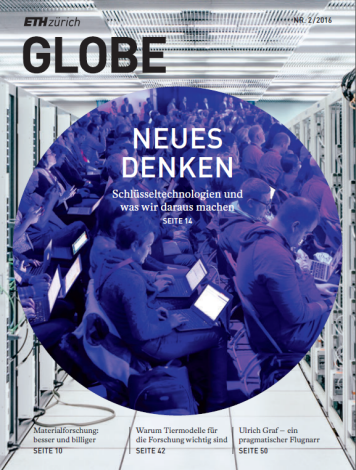News & Events


June 22, 2016
ETH Phenomics Center featured in ETH Globe June/2016. To view the article "Of researchers and rodents", please click Download EPIC in ETH Globe (PDF, 188 KB).
June 22, 2016
Standardized Phenotyping service now available at ETH Phenomics Center. To learn more, please see the Download Fact Sheet (PDF, 1 MB).
Latest News
How root phloem development influences carbon allocation and growth

A recent "Journal of Experimental Botany" study by the Truernit and Zeeman groups (IMPB) reinforces the view that the phloem, the tissue transporting sugars in plants, is central to growth coordination.
Widespread hypermodified β-helical peptides in common bacteria

A recent Chem paper by the Piel (IMB) and Sunagawa (IMB) groups provides insight into the structure of a family of cytotoxic β6.3-helical peptides that occur in phylogenetically diverse and well-known bacteria.
Mapping in unprecedented detail human mini-brains’ response to chemical signals

Scientists from the Quantitative Developmental Biology lab of Barbara Treutlein and their colleagues from the Universities of Basel and Copenhagen have created the most detailed picture yet of how early human brain tissue responds to the chemical signals that guide brain development, offering a powerful new resource for studying the origins of the human nervous system – and what happens when development goes off course.
Fellowship programmes: Doctoral and postdoc projects in AI research and clinical practice
The ETH AI Center and Bosch Health Campus deepen their partnership to translate AI research into clinical impacts and inform about their joint fellowship programmes.
2025 in Review

In 2025 we celebrated the graduation of 70 Master’s students and 35 doctoral graduates, as well as many awards, prizes and scientific milestones; we welcomed Na Cai as a new faculty member and celebrated Andreas Moor’s promotion following his tenure; we saw significant progress in the Botnar Institute of Immune Engineering; and we hosted renowned speakers at our seminars and partner events. Watch the video to find out in detail what was going on at D-BSSE in 2025!
Seminars
EPIC organizes seminars regularly under the Lecture Series: Technology Development in Animal Experimentation. The seminars focus on new methods and technologies for experimental animal research and are eligible for obtaining credit points of the Cantonal Veterinary Office Zurich for continuing education in animal experimentation. Please note that for 1 credit point, you need 4 hours of seminars. You can collect 3 certificates from this Lecture Series for receiving 1 credit point worth of 1/2 day continuous education.
Below you find information about past and future seminars.
February 13, 2017 at 5:00pm - Prof. Auwerx: Cross-species genetic mapping of targets in mitochondria, metabolism and aging.
We are pleased to invite you to the next Molecular Health Sciences / EPIC Research Progress Seminar with Prof. Johan Auwerx taking place on Monday, February 13, 2017 at 5pm in the seminar room HCI G3 at ETH Hönggerberg..
Prof. Auwerx, M.D., Ph.D. heads the Laboratory of Integrative and Systems Physiology at EPFL in Lausanne. His laboratory is using systems approaches to map the signalling networks that govern mitochondrial function and as such regulate organismal metabolism in health, aging and disease. His groups applies a state-of-the-art biological toolkit to study a variety of model systems, ranging from the plant Arabidopsis thaliana, over the nematode Caenorhabditis elegans and the mouse all the way to humans. Prof. Auwerx's research addresses basic biomedical questions, but also fosters the translation into novel preventive and therapeutic strategies for common diseases, such as type 2 diabetes, frailty, and obesity, as well as rare inherited mitochondrial diseases. You can find more information at external page http://auwerx-lab.epfl.ch/
January 26, 2017 at 5:00pm - Dr. Jolanda Baumgartner: The chick embryo as a model system for bone and Dr. Jessica Stevenson: Fish and their parasites as experimentally tractable, relevant models for epidemiology
We are pleased to invite you to the next EPIC methodology seminar highlighting two non-rodent animal models that represent an interesting contribution to the three R principles: chicken embryos to study bone regeneration and guppy fish used for epidemiological studies. The seminar takes place on January 26, 2017 at 5pm at ETH Hönggerberg, HPL D32.
Talk 1: Dr. Baumgartner will speak about: The chick embryo as a model system for bone
Many achievements in developmental biology are based on the chick embryo, but it is also interesting regarding skeletal research due to a lot of similarities to other vertebrates. Compared to conventional in vivo animal models the chick embryo offers a cheaper, less complex and ethically more accepted alternative. In this respect, an experimental framework was developed by combining an ex vivo chick embryo femur model with micro-computed tomography and bioreactors to investigate bone regeneration in a longitudinal manner leading to a massive reduction in number of animals used which is one of the three R’s principles.
Talk 2: Dr. Stevenson will speak about: Fish and their parasites as experimentally tractable, relevant models for epidemiology
The seminar will be followed by an Apéro. Please feel free to distribute the information to your interested colleagues. We are looking forward to an exciting seminar.
November 2, 2016 at 4:00pm - Prof. Andrew J. Macpherson, Professor of Medicine, Director of Gastroenterology, University Hospital, Bern: Donald Trump’s philosophy applied to microbiota research: keeping the bugs out
We are pleased to invite you to the Inaugural Lecture for the EPIC Isolator Facility to be held by Prof. Andrew J. Macpherson, Professor of Medicine, Director of Gastroenterology, University Hospital, Bern. The lecture will take place on November 2, 2016 at 4pm at ETH Hönggerberg, building HCI, room HCI J3 and will be followed by an apéro. Prof. Macpherson will talk about: Donald Trump’s philosophy applied to microbiota research: keeping the bugs out.
October 24, 2016 at 5:00 pm - Dr. Ralph Kühn from the Max Delbrück Center for Molecular Medicine (MDC) in Berlin: Mouse Genetics in the Era of CRISPR/Cas9
Dr. Kühn is Head of the iPS cell based disease modeling group as well as Head of the Transgenic Core Facility at MDC. He has a long track record in mouse genetic engineering technology and his current research is focused on utilizing and improving the efficiency of CRISPR/Cas9 based mutagenesis in mouse zygotes and human iPS cells.
The seminar will take place in HPL D32.
February 15, 2016 at 5:00 pm: Sensitive tests to uncover motor and non-motor phenotypes in animal models - Franziska Richter, DVM, PhD from the University of Leipzig, Institute of Pharmacology, Pharmacy and Toxicology
Abstract: Since animals are used to model human diseases they are required to recapitulate specific features, including the pathophysiological substrate (construct validity), the phenotype (face validity) and therapeutic response (predictive validity). Genetic models based on mutations known to cause the disease in humans, or with deletion of a specific gene of interest, generally provide construct validity. Although many of these models do not show symptoms required for appropriate face validity when tested in conventional behavioral tests, careful examination by experts in the field using state of the art equipment often uncovers phenotypes (for review see Chesselet MF, Richter F 2011 Lancet Neurology; Richter F, Richter A 2014 Progress in Neurobiology). Furthermore, a behavioral readout is advantageous for characterization of a novel gene product or gene mutation, as it provides valuable insights on the function of complex organs or organic systems, such as the central nervous system. Dr. Richter will present a set of sensitive behavioral tests (e.g. Ethovision tracking software, Catwalk, rotarod, grip strength, hotplate) to observe motor and non-motor phenotypes in animal models. She will discuss what we can learn from phenotyping of genetic models about the underlying genetic modification and the function of genes of interest.
Several of the equipment discussed by Dr. Richter for behavioral analysis is currently available in EPIC and accessible for your use. As for our other EPIC seminars, participants will receive a continuing education certificate for this Seminar.
September 07, 2015 at 11:30am: Speakers from Jackson Laboratories: Charles Miller, Director of Marketing and Customer Support; James Keck, Senior Director, In Vivo Pharmacology & Clinical Lab Services; Ralph Gareus, Business Development for Europe
The Jackson team will present its available humanized mouse models (huNSG/PDX) as tools for studying cancer, inflammatory and infectious disease, and hematopoiesis and will also highlight on Animal Models to Improve Engineered T cell Therapy for Cancer.
More information on Jackson can be found at external page https://www.jax.org
June 29, 2015 at 2:00pm: Florian Raes, CNRS (Centre for Small Animal Imaging), Orléans, France
The lecture will highlight applications of our newly established state-of-the-art ultrasound and photoacoustic system (Visual Sonics) for laboratory animals.
Mr. Raes will present different methods for ultrasound and photoacoustic imaging.
- a bimodal method to assess early changes of intratumoral oxygenation on murine breast adenocarcinoma models: Photoacoustic imaging coupled with oxygen partial pressure measurements;
- hypoxia monitoring by photoacoustic imaging during assessment of antitumor effects in pancreatic and breast carcinoma orthotopic mouse models;
- a bimodal strategy for sentinel lymph node exploration based on fluorescence and photoacoustic imaging with spectral unmixing; and
- embedded biophotonics, photoacoustic & high resolution ultrasound imaging for multimodality imaging of complementary biomarkers in oncopharmacology
June 2, 2015 at 5:00pm: Prof. Janos Vörös, Institute of Biomedical Engineering, D-ITET: Miniaturized, paper-based immunofiltration assay for the multiplexed analysis of 1 µL samples
Abstract: Recently the group of Prof. Vörös has miniaturized ELISA type sandwich assays such that now 10 macromolecules from 1 microliter blood without loss of performance can be detected. The features of the system are: 1 microliter sample volume; ~1h total assay time; low antibody consumption (less than 10 ng antibody is needed per data point); compatibility with either fluorescent or enzyme linked immunoassays; 10 proteins can be quantified in each sample; typical limit of detection is 0.1 pM limited by the antibody affinities; and 64 samples can be analyzed parallel. Prof. Vörös' group is looking for partners who have potential applications for such a system (e.g. analysis of tail vein samples).
Dierk Berger, EPIC Transgenic Core Facility and Prof. Anton Wutz, Institute of Molecular Health Sciences, D-BIOL: Generating genetically modified mice at ETH Zurich
Abstract: Transgenic mice have become an increasingly important tool for studying diseases. Advances in method development have repeatedly changed traditional transgenic strategies facilitating faster and more powerful gene modifications. One recent example is the introduction of CRISPR nucleases to genome engineering in mice. The speakers will provide an overview of current transgenic techniques and their implementation within the recently established EPIC Transgenic Core Facility and will be discussing with you your specific project needs.